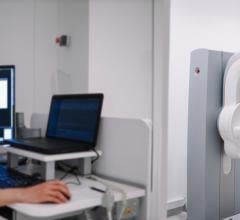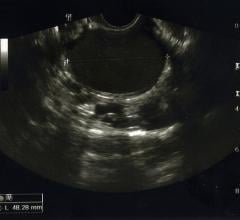
August 12, 2015 — A new study reports women who receive a shorter course of whole breast radiation therapy for early stage disease experience less toxicity and improved quality of life compared to those who undergo a longer course of treatment. The study was conducted by researchers from The University of Texas MD Anderson Cancer Center.
Published in JAMA Oncology, the authors believe these findings should be communicated to women as part of the shared decision-making between breast cancer patients and their physician.
Historically in the management of breast cancer in the United States, radiation treatment has been given in smaller doses over a longer period of time, in a method called conventionally fractionated whole breast irradiation (CF-WBI); the alternative is higher doses over a shorter period of time, or hypofractionated whole breast irradiation (HF-WBI).
Decades ago, the U.S. radiation oncology community looked at abbreviating treatment time with disappointing results, explains MD Anderson’s Simona Shaitelman, M.D., assistant professor, radiation oncology.
“Those studies were done with now-antiquated technologies,” said Shaitelman, the study’s first author. “Since then, with advances in technology, randomized studies in the United Kingdom and Canada have shown equal rates of recurrence in both groups, as well as equal survival. Yet our radiation oncology community has been slow to adopt the practice.”
In fact, the MD Anderson researchers note that only one-third of patients for whom HF-WBI is currently recommended as appropriate treatment by the American Society of Radiation Oncology (ASTRO) actually receive the shorter course of therapy.
“So the question is, with modern technology, and knowing that the survival and recurrence outcomes are equal, can we offer patients a better option? It was essential that we look at how we were giving therapy and if that therapy impacted patients’ quality of life, both acutely during treatment and in the short-term after treatment.”
For the prospective, unblinded trial, 287 women with early breast cancer were randomized to receive either CF-WBI or HF-WBI — 149 and 138 patients, respectively. All were 40 years of age or older, treated with breast conserving surgery and had Stage 0 – 2 disease; 76 percent of the patients were overweight or obese. Of note, previous studies with HF-WBI excluded patients with a larger body mass index (BMI), despite obesity being a strong associated risk factor for the disease.
Also, the MD Anderson study included a “boost dose” as part of the treatment. The researchers note that previous HF-WBI studies did not systematically look at this practice of giving additional treatment to target the tumor bed with a higher dose.
The treatment arms were well matched for both baseline quality of life and treatment characteristics. Using a questionnaire designed to assess the quality of life of breast cancer patients, participants self-reported their overall well-being prior to treatment and six months after completing their therapy. Physicians assessed patient toxicities weekly during treatment and six months after completing radiation.
The researchers found that compared to the CF-WBI cohort, those randomized to HF-WBI experienced less acute toxicity during treatment, including: breast pain, dermatitis, skin darkening and fatigue. At six-month follow-up, toxicities were generally similar between the HF-WBI and CF-WBI patients, although the HF-WBI patients were noted to have less fatigue, and better ability to care for their family, compared to those treated with CF-WBI.
“Patients who received the shorter course reported less difficulty in caring for their families’ needs. This is a major priority for women undergoing breast cancer radiation,” said Shaitelman. “Most are busy working mothers, working inside or outside the home, and are juggling a number of priorities. It’s paramount that we address this need.”
The findings provide some of the first data to show a benefit with the shorter course of treatment – not just an alternative for patients, said Benjamin Smith, M.D., associate professor, radiation oncology, MD Anderson.
“This study fills in a missing piece in the literature,” said Smith, the study’s corresponding author. “No longer do I regard the shorter course of treatment as just an option for patients, but rather the preferred starting point for discussion with patients if they need whole breast radiation.”
Tumor control outcomes continue to be followed; to date no meaningful difference in survival has been found, said the researchers. Also, data like this and other studies are substantive enough that Smith feels it would be worthwhile for organizations like ASTRO and NCCN to consider expanding recommendations for patients to receive HF-WBI.
For more information: www.mdanderson.org


 April 16, 2024
April 16, 2024 








